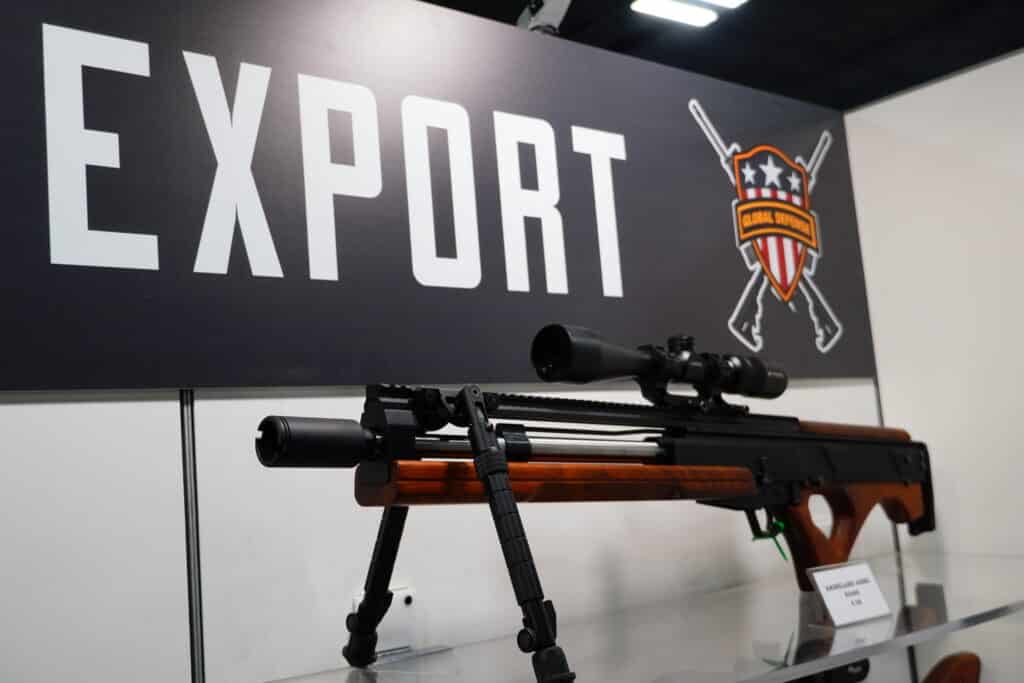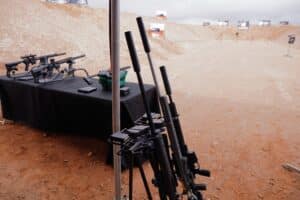This week, thanks to your membership dues and support of this independent publication, I will be headed up to New York City to cover the final section of the corruption case against the NRA. I’ll bring you reports from the courtroom in what is the most consequential case in the history of the gun-rights movement.
But, before then, I have an exclusive interview with Cam Edwards for you. It’s likely you know Cam as the editor of Bearing Arms. But he also spent years working in the NRA’s media operation.
He gives an insider’s view of what it was like working there as the corruption was unfolding at the highest levels. He unloads on the extravagant personal spending that NRA leadership, including Wayne LaPierre, paid for with the charity’s money. He also calls for sweeping reforms to the gun group.
Contributing Writer Jake Fogleman examines the ruling that revived Mexico’s lawsuit against American gun companies. He looks at the appeals court’s reasoning and how it implicates future lawsuits.
Plus, we have a second exclusive interview for you. This one is with a gun exporter. He explains how the Biden Administration’s attempts to restrict licensing could destroy his business.
Podcast: Former NRA News Host Cam Edwards on the Gun Group’s Corruption Trial [Member Early Access]
By Stephen Gutowski
The NRA’s corruption trial carried on last week with Wayne LaPierre taking the stand for the first time. So, I invited one of the best gunwriters in the country on the show to talk about it.
Cam Edwards is not only the editor of Bearing Arms, but he’s a former NRA News and NRATV host. That means he worked for Ackerman McQueen, which is the contractor at the center of the NRA corruption allegations. That gave him some special insight into how the relationship between the two sides.
Cam was willing to be very candid about what he saw during his years at the organization. He said sometimes there were signs of outrageous spending, but he said those in the lower levels of each side didn’t know about the kind of mismanagement LaPierre and others had admitted to in court.
He decried the way high-level executives wasted NRA money on their own personal expenses. He pointed to former NRA Treasurer Woody Philips using the group’s funds to commute from Texas to Virginia. He said he would often forgo reimbursement for legitimate business expenses when working on behalf of the NRA and never dreamed of using NRA funds for his commute after he moved several hours from the office he broadcast from.
Cam said he knew many Ackerman and NRA employees who were as reserved in their expense accounting as he was because they believed in the group’s mission. He said they also understood that the bulk of the NRA’s money came from regular members giving money that was often a not insignificant part of their family budgets.
He argued the corruption that ran rampant at the NRA was unacceptable and things need to change. But he also said the NRA is one of the most important institutions in the gun-rights movement and needs to be saved.
Plus, I talk about my time at SHOT Show with Contributing Writer Jake Fogleman and the effect of the Biden Administration’s pause on gun exports.
You can listen to the show on your favorite podcasting app or by clicking here. Video of the episode is available on our YouTube channel. Reload Members get access on Sunday, as always. The show goes public on Monday.

Analysis: What Mexico is Counting on in its Suit Against American Gunmakers [Member Exclusive]
By Jake Fogleman
A federal appeals court brought Mexico’s civil liability suit against the US gun industry back to life this week. Gun-control advocates are hoping the ruling provides an opening to hollow out the industry’s liability protections moving forward.
On Monday, a three-judge panel for the First Circuit Court of Appeals reversed a 2022 lower court order dismissing Mexico’s $10 billion lawsuit against America’s largest firearms manufacturers and wholesalers. The prior decision held that the companies could not be held liable for criminal gun trafficking through the southern border that they weren’t involved with under the federal Protection of Lawful Commerce in Arms Act (PLCAA).
In an unprecedented move, the First Circuit panel held that while the PLCAA does apply to the case—despite Mexico’s status as a foreign government alleging harms abroad—it does not prohibit the specific legal claims raised about the industry’s sales and marketing practices. Instead, the panel found that Mexico “plausibly alleges” that Smith & Wesson, Sturm Ruger & Co, Glock, Barrett, Beretta, Colt, Century Arms, and Boston-based wholesaler Interstate Arms aid and abet criminal gun trafficking by designing, marketing, and distributing “military-style weapons” that appeal to Mexican drug cartels.
In the immediate term, the ruling simply means that the case will once again go back to the trial court level, where to the suit will resume from where it left off in 2022. And Mexico has a high burden to meet in proving its claims have merit. But, over the longer term, the ruling could spell bad news for the gun industry as it’s forced to fend off more costly litigation using the latest tactic to pierce the PLCAA.
Passed with bipartisan support in 2005, the PLCAA generally shields gun manufacturers and sellers from legal liability for harm caused by a third party’s unlawful misuse of their products. It contains multiple exceptions, however, including damages caused by defective products and in cases where a manufacturer or seller knowingly violated a federal or state law when marketing or selling its firearms. This latter exception, also known as the “predicate exception,” formed the basis of the First Circuit’s decision.
Mexico alleges that the US gunmakers “knowingly” and “deliberately” produce and advertise weapons that gun traffickers and cartel members covet and that they continue to supply certain dealers with these weapons despite knowing which dealers are most frequented by criminal straw purchasers who then smuggle them through the southern border. In this vein, Mexico alleges that the gunmakers are active participants in an ongoing criminal gun trafficking scheme. This mere allegation, not yet supported by any hard evidence, was enough to convince the panel that the suit fell under the PLCAA’s predicate exception.
“It is therefore not implausible that, as the complaint alleges, defendants engage in all this conduct in order to maintain the unlawful market in Mexico, and not merely in spite of it,” Judge William J. Kayatta wrote in Mexico v. Smith & Wesson et al. “Of course, our holding at this stage is based on the allegations in the complaint, construed favorably to Mexico. Mexico will have to support its theory of proximate causation with evidence later in the proceedings.”
It’s hard to imagine that Mexico will ever be able to provide any hard evidence that the country’s largest and most iconic gun brands have been engaging in a conspiracy to willfully allow violent cartel members to purchase their firearms, especially since the allegation is centered on them making popular guns and selling them to licensed dealers who are overseen by the American government. The same can be said for the prospect of any evidence showing that cartel members are particularly motivated by tailored gun advertisements when deciding which weapons to illegally acquire.
Instead, what’s more than likely is that the case’s discovery process will be used as an opportunity to dredge up as much unflattering private information about the practices of these gun companies as possible. Meanwhile, the case’s continuation means the legal costs incurred by the companies defending against the suit will mount. The coalition of gunmakers may ultimately either be forced to acquiesce to a settlement or suffer financially by not doing so.
This would be in line with the playbook that emerged from the lawsuit filed by the families of the victims of the Sandy Hook shooting against Remington Arms Co. After the Connecticut Supreme Court refused to dismiss the suit against Remington under the PLCAA because of a marketing-based claim and allowed it to proceed to discovery, the gun maker went bankrupt a while later, and the defunct company’s insurers decided to enter into a $73 million settlement rather than continue to fight the case. That settlement also allowed the plaintiffs to release internal Remington documents obtained during discovery.
The First Circuit officially expanded the reach of that playbook by setting a federal precedent endorsing the legitimacy of such suits and allowing foreign governments to get in on the action. US gun-control advocates have already taken note of the potential it created.
Jonathan Lowy, Mexico’s co-counsel in the case, left his position as a long-time staffer for Brady to form the Global Action on Gun Violence, a gun-control group specifically focused on taking an international approach to targeting America’s gun laws. Lowy celebrated the First Circuit’s decision for its potential implications in future cases.
“Not only did the Court recognize the right of another country to sue U.S. gun companies, it also pierced the unfair legal shield that gun companies have been hiding behind since 2005,” he said in a statement.
His group is currently pursuing similar litigation with Mexico over a handful of Arizona gun dealers. He also filed a class action suit against Smith & Wesson in Canadian court, with plans to pursue more future legal challenges.
Indeed, much like the lawsuits that preceded the PLCAA and prompted its passage, gun-control advocates are again looking to hold gunmakers liable for the violence inflicted by armed criminals. Or, failing that, tie them up in costly litigation for years.

‘I Would be Done,’ Gun Exporter on How Biden’s Plan Might Ruin His Business [Member Exclusive]
By Stephen Gutowski
Las Vegas, Nevada — Jordan Young sits in a small booth at SHOT Show 2024 among hundreds of other booths in the Venetian Expo Center on the Vegas Strip. He’s working to recruit new customers for his firearms export business, Global Defense. But he worries the Biden Administration’s plan to restrict those exports will make the effort pointless.
“I would be done,” Young told The Reload. “Out of business.”
Over the past 90 days, the Commerce Department has “paused” issuing new gun export licenses while it reviews its regulations in an effort it has said is designed to prevent American-made guns from falling into the wrong hands. Exporters like Young can still operate under their previously granted licenses, but the licenses come with restrictions on quantity. Plus, Young said Commerce was slowing down licensing even before the pause.
“I started seeing a backup in July in the summer,” he said. “I’ve gotten four licenses since last July.”
He used to get about five per month.
“You don’t have a sale without a license,” Young said. “You can have the money, you can have the guns, you can have everything in place. But, if you don’t have a license, you don’t have a sale.”
Late last month, The Reload published a leaked draft of the proposal Commerce plans to reveal after the pause ends. The plan would impose a slew of new conditions for obtaining an export license for civilian sales of certain firearms, including popular semi-automatic rifles and shotguns. Among the most stringent is a requirement that exporters identify civilian end buyers obtaining passports or other official government IDs.
Senators Dick Durbin (D., Ill.) and Elizabeth Warren (D., Mass.) joined with Representatives Joaquin Castro (D., Texas 20) and Norma Torres (D., Calif. 35) to praise the pause and advocate for an extension. In a letter to the department this week, they called on Commerce to adopt the passport rule and numerous other restrictions.
“As more and more firearms have left American shores, their impact in other countries has worsened,” they wrote. “Reports abound of U.S.-manufactured weapons being used in horrific killings across the globe.”
Young rejected the assertion that he’s responsible for violence in the nations he exports guns to.
“Violence will happen, no matter where you are, no matter what you’ve got. They’ll use a rock, they’ll use a knife, they’ll use a car,” he said. “I mean, they’ll use anything. The bad people are still bad people.”
He also stressed that he only deals with properly licensed importers who follow the laws of the nations they operate in.
“We vet everyone before we even take a license to the Commerce Department. It’s not like I deal with everyone off the street,” Young said. “Our guns are going to licensed importers and distributors in those countries. They have to have licensing, and they have to follow the rules of their country.”
Young said he got into the gun industry because he believes firearms are an “equalizer” for people looking to defend themselves.
“I believe that every person, regardless of where they are geography, has the right to defend themselves,” Young said.
He called the Biden Administration’s proposed export plan “impractical and impossible” and argued that Americans would be justifiably upset if other countries tried to impose similar import restrictions.
“I think it’s going to be setting us up for failure if we can’t rely on our partners and allies around the world to do their job,” he said. “I got to do my job; you’ve got to do your job. Everybody’s got to be responsible for themselves. They work in their own countries; they follow their laws, and they need to be responsible for that. It’d be like if foreign governments told their gun companies to ask American dealers, ‘Who’s buying every gun?’ Then say, ‘Give me a copy of the FBI background check.’”
The draft rule tightens restrictions on licenses for exports to any country that isn’t in the Wassenaar Arrangement, like Israel. But the new restrictions would also be placed on some countries in the agreement, such as Ukraine. In effect, any country that isn’t considered “Group A:1” under Bureau of Industry and Security classifications would fall under the new export requirements.
During the pause on civilian exports, Israel and Ukraine were explicitly exempted, but they would be subject to the rules in the draft proposal. Commerce emphasized that the draft only represents a work in progress and “no decisions on potential policy changes” have been made, especially on how Israel and Ukraine will be treated after the pause.
Young said he has been granted an export license to Ukraine during the pause. But the process took three times as long as usual, and Commerce has been slow to grant licenses to other countries that aren’t supposed to be affected by the pause.
“They haven’t said much. I’ve noticed that they’re asking for a lot more documents than they have in the past. They’re not issuing the license, though,” he said. “They’re supposed to be, as I understood it, continuing to process and issue the licenses for the A1 countries. But I even had to beg them for Switzerland. Beg them. That was one in July that I submitted before the pause.”
Young said he isn’t opposed to following American export policy. However, he questions the logic behind the proposed rules.
“I understand US foreign policy, and I abide by US foreign policy. If they don’t want me to export to a certain country, all they have to do is say ‘No,’ and I don’t export to it. I’m a lawful citizen. I’m an honest guy. I follow our foreign policy. But if our foreign policy is to shut off exports of all of our stuff that the whole world, that doesn’t make a lot of sense.”
He argued the changes aren’t coming from Commerce and the agency is “getting thrown under the bus.”
“I still have a good working relationship with Commerce. It’s not the guys. They’re good, hard-working people,” he said. “I know most of the chiefs, I know most of the licensing officers, the mid-level managers at all these different agencies. I’ve been working with them for years and years and years. It’s not them. They’re doing their job.”
Instead, he views the changes as politically-motivated. Part of what he described as “a concerted effort” by the Biden Administration to diminish the firearms industry.
“Whatever his logical rationale is, he don’t like it,” Young said.
But he said the export pause and proposed new restrictions wouldn’t hit everyone in the industry equally. Large or multi-national gun makers might not see a significant hit or could be able to mitigate any effects by moving international export manufacturing to other countries. Young said midsized companies could see 20 to 30 percent of their business affected.
But exports are a huge part of Young’s business, and he’s worried the Biden Administration will repeat the same maneuver to wipe out the other side of his business.
“Exporting is about half of my business. We also import,” he said. “But I expect that will be next; the import will be next.”
He said smaller companies like his and some of the manufacturers he works with could have trouble surviving under the proposed rules.
“We do a few million dollars a year. It’s not a huge amount,” he said. “We’re a younger company. I’m trying to grow.”
Visibly upset, Young turned to thinking about his future.
“I’m doing what I love. I finally became my own boss, an entrepreneur, doing everything that I wanted to do, and it could all be done tomorrow,” he said before excusing himself to take a meeting with a prospective client he hopes won’t be his last.
That’s it for now.
I’ll talk to you all again soon.
Thanks,
Stephen Gutowski
Founder
The Reload







